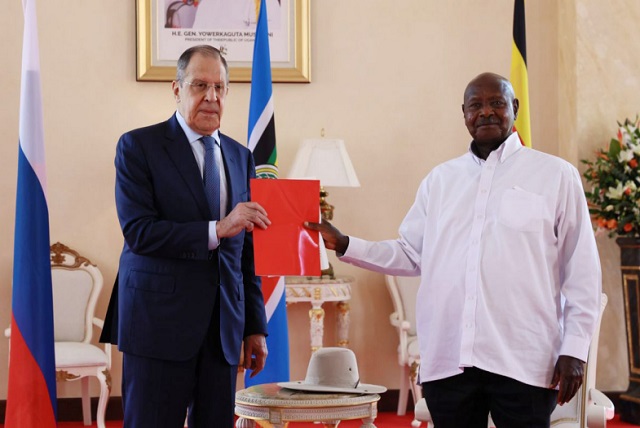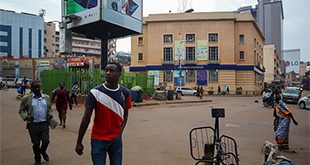
Museveni shrugs off US-Russia enmity
Kampala, Uganda | IAN KATUSIIME | Sergei Lavrov, Russia’s Foreign Affairs minister, wrapped up a four country Africa tour and Uganda was always going to be a key stopover for the long serving Lavrov. It was the first time someone at the level of Foreign Affairs minister was visiting Uganda in the sixty years of Uganda-Russia relations.
Uganda warmed itself in the heart of Russian President Vladimir Putin when it abstained in a UN vote to condemn Russia’s invasion of Ukraine in February. President Yoweri Museveni while hosting Lavrov at State House Entebbe on July 26 underscored Uganda’s strong ties to Russia amid the escalating tension between the superpower and the West.
“We want to trade with Russia. We want to trade with all countries of the world. We don’t believe in being enemies of somebody’s enemy, no. We want to make our own enemies not fight other people’s enemies,” Museveni said. “It is not my job to be pro-West or pro-East. I deal with people according to my interests,” he added.
However Museveni’s fondness for the Russians and Chinese (in the Eastern bloc) is well known because of their policy of non-interference in the politics of African countries. While meeting Lavrov, it was the first time Museveni was seen publicly without a mask perhaps as a sign of his camaraderie with the Russians.
The President said that Czechoslovakia then under the Soviet Union (part of present day Russia) trained Uganda’s first Air Force and said Uganda has benefitted greatly from Russia in security cooperation. Museveni also praised Russia’s strong historical support for Africa’s anti-colonial struggle.
Lavrov said he discussed with Museveni economic cooperation and other bilateral areas that include energy, ideological studies, hydrocarbon, cyber security, agriculture and use of nuclear technology. A Joint Permanent Commission-a working body of the two countries- will detail the way forward ahead of the sixtieth anniversary.
Lavrov revealed that Russia looked forward to the sixtieth anniversary celebrations of its relations with Uganda. The two leaders also discussed global issues where Russia has faced isolation and biting sanctions from the West for its invasion of Ukraine in a war that is still underway five months later.
Uganda stayed away from the loud condemnation of Russia at an emergency session of the UN General Assembly. Unlike its two vital neighbours; Rwanda and Kenya, who voted to condemn Russia, Uganda opted out of the vote.
Adonia Ayebare, Uganda’s Ambassador to the UN, tweeted about Uganda’s position in February: “Uganda Abstained on the UN General Assembly vote on the Ukraine Crisis. As incoming Chair of the Non- aligned Movement (NAM) NEUTRALITY is key. Uganda will continue to play a constructive role in the maintenance of peace and security both regionally and globally.”
Lavrov started his visit in Egypt, flew to Congo, and Uganda before rounding off in Ethiopia. Congo and Uganda abstained while Egypt voted to condemn Russia. Little was known about the foreign minister’s visit apart from a meeting with President Museveni and bilateral sessions with the Russian delegation.
Lavrov who has been Russia’s Foreign Affairs minister since 2004 took a swipe at the U.S. and other Western nations when asked a question about his country’s responsibility in the economic crisis in Uganda. “Our Western colleagues nowadays blame us for everything. This started longtime ago before the special military operation in Ukraine. You remember in 2016 when they said Russia elected President Trump,” Lavrov said speaking through a translator.
Lavrov’s Africa visit was billed as an attempt to drum up support for Russia after increasingly strained relations with countries in Western Europe and North America. African countries import thousands of tonnes of Russian and Ukrainian grain and the disruption of global supply chains as a result of the war has been cited as the main factor for increasing food prices on the continent.
A week before the high profile trip, Russia and Ukraine signed a deal with the United Nations and Turkey aimed at relieving a global food crisis caused by blocked Black Sea grain shipments.
In an interview he granted to Russian media outlets before flying to Africa, Lavrov blamed Western countries for the escalating food crisis as a result of the sanctions slapped on Russia. He also underscored the importance of Russia’s supplies to needy countries like Uganda.
“We are well aware of the importance of Russian supplies of socially important commodities, including food, to many countries around the world. We are mindful that these supplies play an important role in preserving social stability,” he said.
In the joint interview with Russia Today television, Sputnik news agency and Rossiya Segodnya International Information Agency, Lavrov made a pitch on the strategic Russia-Africa relations. “We have an excellent political foundation underlying our relations and a good mutual understanding based on the fact that thousands of Africans who hold positions in their respective governments have studied in Russia and continue to do so,” he said and added “We need to use this human and political capital to achieve economic advancement.”
In an op-ed he published as part of a media campaign for the trip, Lavrov commented “We appreciate the considered African position as to the situation in and around Ukraine,” adding that African countries had come under “unprecedented” Western pressure to join the sanctions.
Russia-Africa summit
Russia is gearing up for the second Russia-Africa summit set for Addis Ababa, the Ethiopian capital, in October. Top on the agenda of the summit is trade, investment and security cooperation. Russia is keen on bolstering trade and economic ties with African countries after U.S.-led sanctions hit hard a number of Russian companies.
The first Russia-Africa summit took place in October 2019 in the Russian coastal of Sochi. The discussions ranged from trade to nuclear energy and mineral extraction. However it was the materiel on display on the sidelines of the summit that most piqued the interest of thousands of delegates and leaders from Africa.
True to form– African countries are large importers of Russian arms. A report early this year by SIPRI, a global arms tracker, indicated that Russia was the largest supplier of weapons for African countries for the period ranging from 2017-2021. Russia’s weapons sales to Africa accounted for 44% of imports of major arms to the continent followed by the US (17 per cent), China (10 per cent) and France (6.1 per cent).
The report had resonance because just a few days before it was released, 17 African countries had voted to abstain when the UN General Assembly passed a resolution condemning Russian aggression against Ukraine.
And Uganda has always had a penchant for Russian weaponry. Between 2011 and 2012, Uganda acquired six Sukhoi-30MK fighter jets from Russia at a price of $635m according to SIPRI. Other weapons Uganda has purchased from Russia include T-90 tanks, Kornet anti-tank missiles, anti-ship missiles, Infantry Fighting Vehicles (IFVs), and other components of the SU-30 combat aircraft. SIPRI data show that Uganda took delivery of 1000 Kornet anti-tank missiles between 2012 and 2013.
However the Russian Sukhoi Su-30MK fighter jets are arguably Uganda’s most prized military asset. As a result, Uganda is widely expected to send a large delegation to the second African summit with Russia.
President Museveni has carried out a careful balancing act between the two superpowers; Russia and U.S., in his 36-year hold onto power. Just hot on the heels of the Russian Foreign Minister’s visit to Kampala is the anticipated arrival of Linda Thomas Greenfield, US Ambassador to the UN, an equally high ranking official of Lavrov’s stature.
****
 The Independent Uganda: You get the Truth we Pay the Price
The Independent Uganda: You get the Truth we Pay the Price


